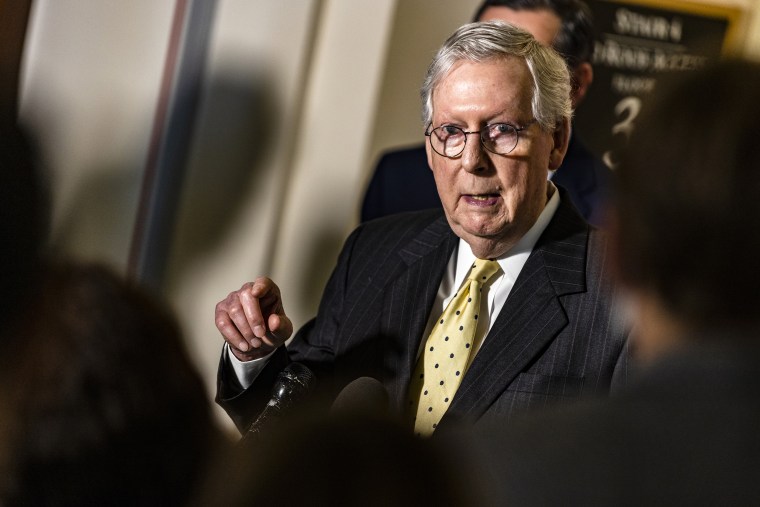WASHINGTON — A battle over the debt limit on Capitol Hill is intensifying after Senate Minority Leader Mitch McConnell and other Republicans dug in this week against voting to raise it.
The Treasury Department has said borrowing authority expires next month, and the United States will not be to able to pay its bills if the debt ceiling is not extended.
"Let me be crystal clear about this: Republicans are united in opposition to raising the debt ceiling," McConnell, R-Ky., told reporters after a Senate GOP caucus meeting Tuesday.
He said Republicans previously favored lifting the debt ceiling on a bipartisan basis but oppose that today because Democrats are pursuing a multitrillion-dollar spending and tax bill the GOP rejects. He has said Democrats should extend the debt limit on a party-line basis in the budget bill.
"So if they want to do all of this on a partisan basis, they have the ability and the responsibility to ensure that the federal government not default," he said.
Moments later, Senate Majority Leader Chuck Schumer tore into his Republican counterpart, saying it is "risky business and dangerous business that Sen. McConnell is involved in."
He said Democrats agreed to extend the debt ceiling under former President Donald Trump, even after Republicans pursued a deficit-raising tax cut on a party-line basis in 2017.
"We didn't play games. We didn't risk the credit of the country. And that's been the history," he said. "Sen. McConnell seems to be trying to break new ground by saying that we should let the country default."
Raising the debt limit would not authorize new spending; it would enable the U.S. to borrow money to pay spending that Congress has approved. It would be necessary with or without the $3.5 trillion bill that President Joe Biden is pursuing.
Democrats control the House and the Senate, but a debt ceiling extension is subject to a filibuster, meaning it would require 60 votes to advance. That means winning the support of at least 10 of the 50 Republican senators.
So far, there are no takers.
Asked if a debt ceiling increase can win 10 Republican votes, Sen. Richard Burr, R-N.C., replied, "No."
Burr is retiring and doesn't have to face voters again. Still, he said he isn't interested in lifting the debt ceiling. Asked if he worries about an economic meltdown if the U.S. defaults, he deflected to Democrats: "It's in their hands. They're in the majority."
Sen. John Kennedy, R-La., said he doesn't think McConnell is bluffing.
"Mitch McConnell is as serious as four heart attacks and a stroke. And I don't think he's going to budge," Kennedy said. "Many of my colleagues who voted for the infrastructure bill are getting the living hell kicked out of them at home by their Republican base. And I think that will make them even more inclined to vote against a debt ceiling increase."
Last month, as Democrats began work on the $3.5 trillion spending and tax bill, 46 GOP senators led by Sen. Ron Johnson, R-Wis., signed a letter saying they "will not vote to increase the debt ceiling, whether that increase comes through a stand-alone bill, a continuing resolution, or any other vehicle."
Even Sen. Susan Collins, R-Maine, who didn't sign the letter, said she's doesn't support a debt limit hike unless it is "accompanied by some reforms" to "get spending under control" — although she said she doesn't want to see across-the-board cuts known as sequestration, which were used in the past.
The White House expects Republicans to blink. Biden is deferring to congressional leaders on the mechanics of passing it, but he doesn't believe the debt ceiling should be subject to negotiation at all, a White House official said. The official said Biden is adopting the same stance as former President Barack Obama in his second term — no negotiating over the debt limit — and added that Republicans caved then.
The White House official added that one risk of tying the move to the reconciliation package is that it is not clear the bill will be passed by the October deadline to lift the debt ceiling.
House Speaker Nancy Pelosi, D-Calif., last week ruled out raising the debt limit in the reconciliation bill.
A senior Democratic aide said it is not possible unless the party rewrites the budget resolution and kicks off the entire reconciliation process again, with a new vote-a-rama in the Senate.
Experts have warned that breaching the debt limit — or even getting close to the deadline — would be dangerous for the U.S. economy and potentially invite irreparable harm.
Democrats are considering attaching a debt ceiling extension to a government funding bill ahead of a Sept. 30 deadline to avert a shutdown, although they haven't announced any decisions.
"Every member of my caucus agrees we cannot allow a government shutdown or a catastrophic default," Schumer said. "To prevent both of these from happening, it will require bipartisan cooperation."

